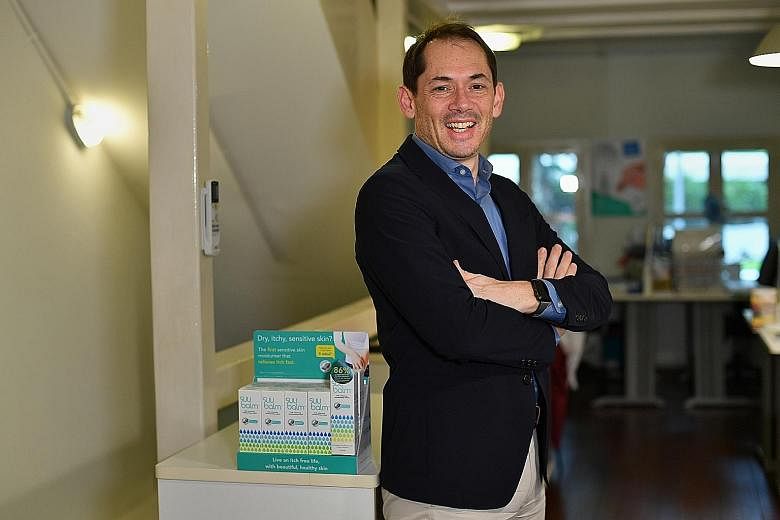Q How was Suu Balm conceived?
A Good Pharma Dermatology was set up with the aim of producing its own brand of consumer healthcare products.
We were introduced to National Skin Centre (NSC) dermatologist Tey Hong Liang by the Intellectual Property Intermediary (IPI).
Dr Tey, who specialises in itch research, wanted to commercialise his invention - a rapid itch-relieving moisturiser.
He had worked with the head pharmacists in NSC to prescribe this product to 1,000 patients. After receiving positive feedback, he wanted to make the product available to the wider community. This moisturiser, now branded as Suu Balm, was commercialised by Good Pharma Dermatology.
It was created to encourage the frequent usage of moisturiser among eczema patients. By offering itch relief, it encourages people with eczema to moisturise frequently, hence preventing their skin from becoming dry.
In March 2015, we distributed the product to all government and private dermatologists, as well as several general practitioners.
Q How has the market demand for Suu Balm been?
A From the commercial perspective, launching the product through dermatologists and family doctors gave the product credibility, which formed a strong foundation for professional usage.
The phone calls started coming in soon after, with customers who had bought the moisturiser from their doctors requesting more.
We realised the need to make our product more widely available to consumers. In October 2015, we started to sell our product online. Early last year, we launched it in bricks-and-mortar retail stores. We signed a one-year contract with Watsons and sales went through the roof. We then expanded to Guardian, Unity and FairPrice.
Currently, sales are very good, considering that we are a small start-up. We are selling about 10,000 units per month.
There are several local companies offering skincare products, but these are moisturisers and skin-wash products. Doctors have been prescribing topical steroids, but there was nothing to stop itching. Suu Balm fills this gap in the market.
From a marketing perspective, a product meeting a need that has not yet been met is a differentiated product. This makes our business growth stronger.
Q What are some challenges you have had to deal with?
A As a start-up, resource and manpower constraints are key issues.
We coped with our manpower needs by operating in a unique way. We tapped working mothers, to attract mothers who wished to have flexible working hours. Most of our women staff work part-time.
Another issue was our desire to maintain 100 per cent ownership of our business, which meant we avoided getting venture capital funding or other external funding, where the external parties would have a share of the business.
We made a choice to fund ourselves and expand as fast as our pockets allow us. But that makes us work on a smaller scale, and be slower and more conservative in expansion.
To save costs, we work with smaller marketing agencies rather than big-name ones.
Consumer products, especially medicated skin products, usually come from large firms. As a small company going into the same category against major brands like Johnson & Johnson, we can easily get squashed. To set our brand apart from others, we have clinical evidence from NSC, while many of these major brands do not.
Process-wise, we initially faced challenges in running things well and setting up a proper business framework, whether it was for a leave-taking system or a budgeting system. We spent a great deal of time finding a good financial operations manager to put these processes in place.
Q How has the company grown?
A We wanted to expand our brand as fast as possible across South-east Asia, and so have appointed distributors for retail stores across various countries.
Other than Singapore, we have a retail presence in Thailand, Malaysia, the Philippines and Vietnam.
In May last year, we launched Suu Balm in Ireland, which will be our gateway to Britain and the rest of Europe.
Suu Balm is also available in China and Mongolia.
Our most established sales are in Singapore, the Philippines and Thailand.
In terms of retail revenue, from 2015 till end-March this year - our second full year of sales - we made $2.3 million. We expect sales to reach $6 million by the end of this financial year.
Q How is Good Pharma Dermatology looking to expand its services in future?
A We are looking to focus on the elderly group, whose skin dries easily. This is especially so considering Singapore's ageing population.
This year, we have invested about $500,000 in our Philippine, Thai and Irish markets. We intend to double these investments each year.
We also intend to expand into Indonesia, Australia, South Korea and the United Arab Emirates over the next 12 months.
Correction note: This story has been edited to clarify that the moisturiser, now branded as Suu Balm, was commercialised by Good Pharma Dermatology.

